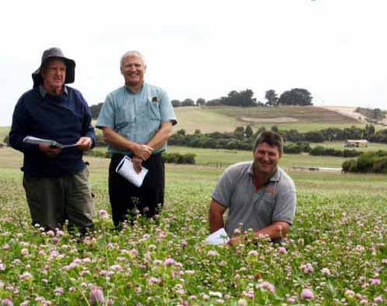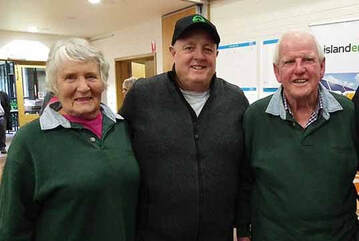 Bob Davie, left, with fellow researchers Roy and Mark Roberts
Bob Davie, left, with fellow researchers Roy and Mark Roberts at Bimbadeen.
TWENTY years ago when Bob Davie talked about carbon farming he was regarded as a bit of a nutter. For the past decade he’s been preaching to the converted, people like him who understand the difference between carbon and carbon dioxide, and offsets and insets.
But with a recent double-page spread in the Herald Sun, the Phillip Island farmer has now entered the mainstream.
As a pioneer of carbon farming, Bob couldn’t be happier. He thinks people – including many people in power – have suddenly “got it”. “It’s going to happen … I didn’t think I’d live to see the day.”
Bob’s message will be that farmers have nothing to fear from zero emissions targets. In fact they have everything to gain.
| He echoes climate academic Ross Garnaut, who believes carbon credits could be as valuable a commodity on the world market as wool. They are a counter to the National Party, which argues that farmers should be exempt from meeting emissions targets. The tide has turned, says Bob. Meat and Livestock Australia is already committed to being carbon neutral by 2030. Farmers want to know how to transition and how to make it work. | “There is no way we are going to whack regional Australia, hurt regional Australia, in any way shape or form just to get a target for climate in 2050 … We are not going to hurt those wonderful people that put food on our table.” |
“I believe most farmers can become carbon neutral fairly easily. I believe a lot of farmers are already carbon neutral and don’t know it.”
“I’m really pleased it’s finally taking off. There are more and more inquiries and articles in the papers. It feels good. I’ve always felt I’ve been on the right track.
Bob says he’s been carbon farming for 65 years – “45 years without knowing I was doing it.”
Bob’s carbon farming experiments have been carried out at Bimbadeen, the Davie family’s 140-hectare beef property at Ventnor.
When Bob and Anne bought Bimbadeen in XX it was covered in tea-tree. “We asked the Department of Agriculture what we should do. They said to plough it all in and that built up a huge amount of organic matter in the soil by accident.
“We were a bit ahead of our time. At an early stage we realised smaller paddocks were the way to go. We divided our paddocks up into 10ha paddocks, and they’re now about 2ha.
“You put the cattle in a paddock, graze it down then move them out. We’ve introduced dung beetles to increase the microbial activity. The paddock creates carbon by photosynthesis. It’s going back into the soil.”
More than two decades of research convinces him that most farms actually have a balance of carbon that they could sell as offsets if an Australian government introduced carbon trading. With the leaders of the US and UK stepping up the pressure on Australia, that seems inevitable.
The initial carbon test involves taking core samples at locations across the farm to establish a baseline for the farm. In successive years the test is repeated and any increase in carbon content becomes available for farmers to trade as carbon offsets.
When I ask Bob if other farmers thought he was mad when he spouted this stuff 20 years ago, he laughs. “From the time I brought Brahmin cattle down from the north in `67, they wanted to lock me up. But we built up a brilliant herd. Now with climate change, it’s shown they’re great adapters.”
In the early years, he was just following his own interests in carbon farming. In recent years he has worked with Westernport Water, Bass Coast Landcare Network, the Energy Innovation Co-op and Totally Renewable Phillip Island (TRPI) which aims for zero emissions on the island by 2030. “Such dedicated people – absolutely marvelous to work with.”
Bimbadeen currently trades carbon offsets under a voluntary contract system. So far they have been trading with three Melbourne businesses which have all become carbon neutral as a result of buying the offsets.
 Anne and Bob Davie flank Ric Oldham, who bought the first
Anne and Bob Davie flank Ric Oldham, who bought the firsttonne of carbon inset at the TRPI auction.
Several more farms are in the wings and the movement is spreading on the island. Bob has suggested Phillip island Nature Parks carbon test Churchill Island.
He says farmers have to know there will be a return for increasing the carbon on their farms. “They will be interested if they can see an extra income by growing a crop that never has to leave the property.
“I really believe it would be a great thing – and I would be howled down for saying this – if the US puts a tariff on Australian goods with high emissions because it will force manufacturers and producers to act.
“If the US said we’re only taking low- or no-emissions beef we could send them a container load tomorrow.”